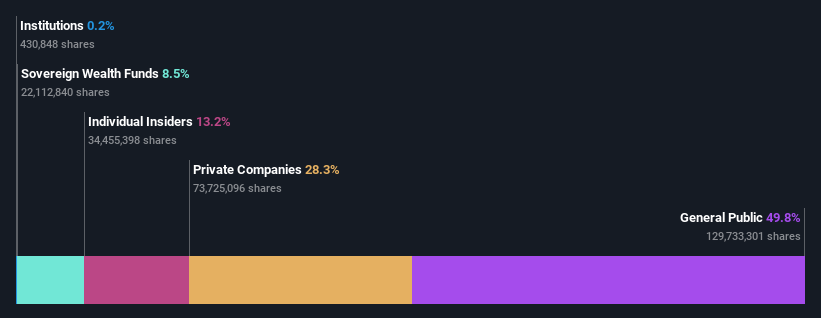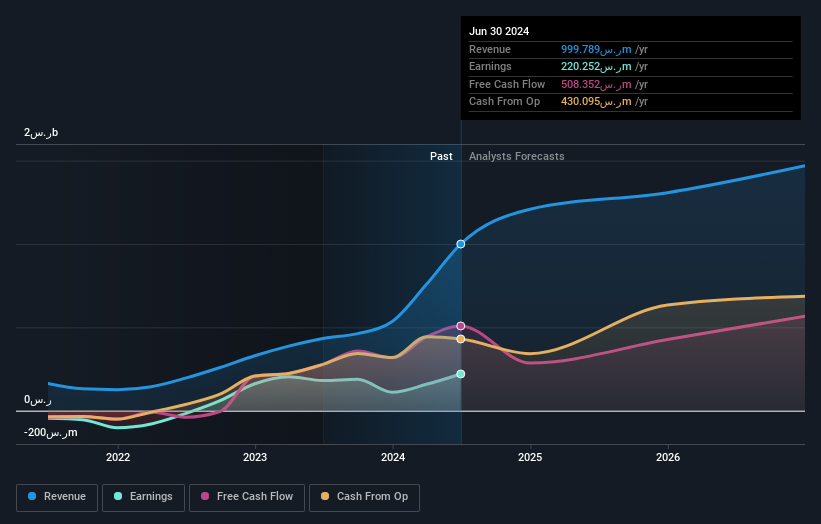- Saudi Arabia
- /
- Real Estate
- /
- SASE:4090
Taiba Investment Company's (TADAWUL:4090) stock price dropped 3.4% last week; individual investors would not be happy

Key Insights
- Taiba Investment's significant individual investors ownership suggests that the key decisions are influenced by shareholders from the larger public
- The top 6 shareholders own 50% of the company
- Insiders own 13% of Taiba Investment
A look at the shareholders of Taiba Investment Company (TADAWUL:4090) can tell us which group is most powerful. The group holding the most number of shares in the company, around 50% to be precise, is individual investors. That is, the group stands to benefit the most if the stock rises (or lose the most if there is a downturn).
And last week, individual investors endured the biggest losses as the stock fell by 3.4%.
In the chart below, we zoom in on the different ownership groups of Taiba Investment.
View our latest analysis for Taiba Investment

What Does The Lack Of Institutional Ownership Tell Us About Taiba Investment?
Small companies that are not very actively traded often lack institutional investors, but it's less common to see large companies without them.
There could be various reasons why no institutions own shares in a company. Typically, small, newly listed companies don't attract much attention from fund managers, because it would not be possible for large fund managers to build a meaningful position in the company. It is also possible that fund managers don't own the stock because they aren't convinced it will perform well. Institutional investors may not find the historic growth of the business impressive, or there might be other factors at play. You can see the past revenue performance of Taiba Investment, for yourself, below.

Hedge funds don't have many shares in Taiba Investment. Looking at our data, we can see that the largest shareholder is Assila Investments Co. with 22% of shares outstanding. With 8.5% and 7.7% of the shares outstanding respectively, Public Investment Fund and Mohamad Al-Issa are the second and third largest shareholders.
We did some more digging and found that 6 of the top shareholders account for roughly 50% of the register, implying that along with larger shareholders, there are a few smaller shareholders, thereby balancing out each others interests somewhat.
While studying institutional ownership for a company can add value to your research, it is also a good practice to research analyst recommendations to get a deeper understand of a stock's expected performance. While there is some analyst coverage, the company is probably not widely covered. So it could gain more attention, down the track.
Insider Ownership Of Taiba Investment
While the precise definition of an insider can be subjective, almost everyone considers board members to be insiders. Company management run the business, but the CEO will answer to the board, even if he or she is a member of it.
Most consider insider ownership a positive because it can indicate the board is well aligned with other shareholders. However, on some occasions too much power is concentrated within this group.
Our most recent data indicates that insiders own a reasonable proportion of Taiba Investment Company. It is very interesting to see that insiders have a meaningful ر.س1.5b stake in this ر.س11b business. Most would be pleased to see the board is investing alongside them. You may wish to access this free chart showing recent trading by insiders.
General Public Ownership
The general public-- including retail investors -- own 50% stake in the company, and hence can't easily be ignored. While this group can't necessarily call the shots, it can certainly have a real influence on how the company is run.
Private Company Ownership
It seems that Private Companies own 28%, of the Taiba Investment stock. Private companies may be related parties. Sometimes insiders have an interest in a public company through a holding in a private company, rather than in their own capacity as an individual. While it's hard to draw any broad stroke conclusions, it is worth noting as an area for further research.
Next Steps:
While it is well worth considering the different groups that own a company, there are other factors that are even more important. To that end, you should learn about the 3 warning signs we've spotted with Taiba Investment (including 1 which is a bit unpleasant) .
Ultimately the future is most important. You can access this free report on analyst forecasts for the company.
NB: Figures in this article are calculated using data from the last twelve months, which refer to the 12-month period ending on the last date of the month the financial statement is dated. This may not be consistent with full year annual report figures.
Valuation is complex, but we're here to simplify it.
Discover if Taiba Investment might be undervalued or overvalued with our detailed analysis, featuring fair value estimates, potential risks, dividends, insider trades, and its financial condition.
Access Free AnalysisHave feedback on this article? Concerned about the content? Get in touch with us directly. Alternatively, email editorial-team (at) simplywallst.com.
This article by Simply Wall St is general in nature. We provide commentary based on historical data and analyst forecasts only using an unbiased methodology and our articles are not intended to be financial advice. It does not constitute a recommendation to buy or sell any stock, and does not take account of your objectives, or your financial situation. We aim to bring you long-term focused analysis driven by fundamental data. Note that our analysis may not factor in the latest price-sensitive company announcements or qualitative material. Simply Wall St has no position in any stocks mentioned.
About SASE:4090
Taiba Investment
Invests in, buys, owns, develops, sells, leases, operates, maintains, markets, and manages real estate properties in the Kingdom of Saudi Arabia.
Mediocre balance sheet unattractive dividend payer.


